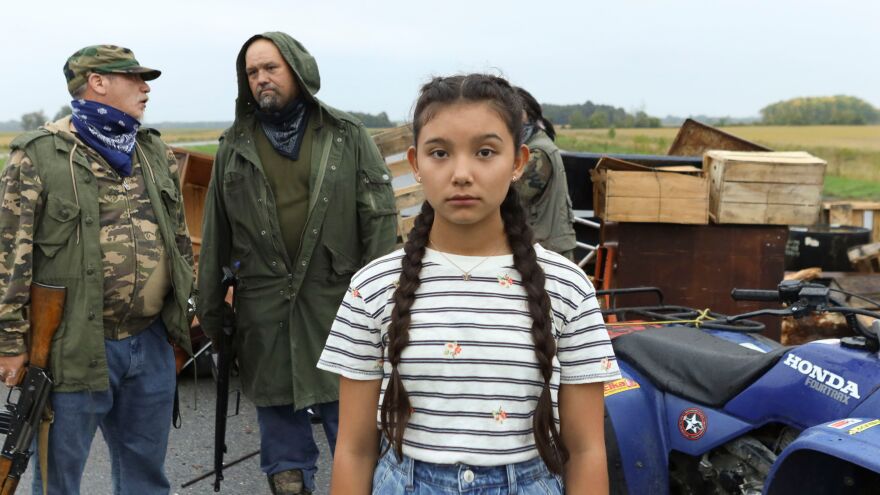Being American, I had no idea until watching Tracey Deer’s Beans about the 1990 standoff in Quebec between the Mohawk community at Kanesatake and the local government of the town of Oka (and eventually more than just the local government), but its significance is immediately clear. And I while I can have no way of knowing what it would be like otherwise, I do wonder if my complete ignorance of the situation actually enhanced the tension, as I was just as in the dark about how things would turn out as the characters in the movie are.
But that’s not where we start. Tekehentahkhwa is a 12-year-old Mohawk girl who goes by the nickname “Beans,” much to the relief of the white woman who runs the elite school Beans wants to go to. As far as we can tell, she seems to be a typical kid—she’s sweet, cares about her precocious little sister, and lives modestly with her father and pregnant mother. One day the community bands together to protest a proposed golf course expansion into land they had long considered theirs (and which included a burial ground), a scene that explodes into violence when the police attempt to move the Mohawk using teargas and many shots are fired by both sides. We see much of this through Beans’ eyes, and as I also had no clue this was coming, it’s a shocking occurrence.
At this point we more or less pick up two threads, one following how the ensuing standoff plays out within the Mohawk community and between them and the white residents in Oka, the other following a sort of coming-of-age story with Beans. Of course, the latter doesn’t exist apart from the former, and we see how such an extreme incident can affect a 12-year-old girl, in addition to the much more mundane insidiousness of the racism that already existed among the white people in the town.
Many of the beats Beans hits as we watch her growing up at this time are like what we’d find in other similar stories, as she falls in with some older kids who maybe aren’t the best influence, and she tries too hard to impress them, and she experiments with certain ways of being that maybe aren’t consistent with who she’s been, but that also might be necessary for her to explore who she’s going to be. She learns to be mean, she rebels a little, she learns about sex—one scene where she surprised herself by cursing, and then tests it a little bit more just to see how it feels, is especially endearing. But all of this is, of course, happening not just with the standoff around her, but with her as the member of an indigenous community in a country where white people have the power. When she assaults a young white girl without any seeming provocation, she is letting this new “self” she’s auditioning get away from her, but the act also comes along with the layers of complicated feelings that come from being someone in her position.
Eventually, we see how this all resolves, and we see how things smooth out for Beans. And while there’s plenty of her personal, being-a-teenager story that feels pretty by-the-numbers, and we mostly know how that will go, it doesn’t feel as if we’ve jammed two stories up with each other. It does feel like we’re seeing someone learn how to grow up while living in this particular situation. Is this the best possible way to tell each of these stories? Maybe not, but for the most part it works, and besides: when we see a movie about a major historical event, how often do we think about the people who are just living their lives while that’s going on?
Beans is available on VOD platforms



